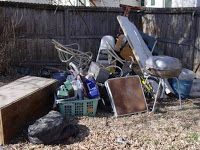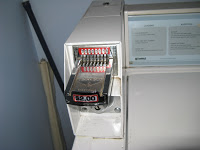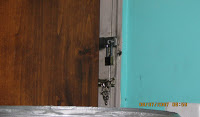Strike team targets multiple-occupancy houses
Are there lots of people coming and going from the house next door at all hours? Do you think it’s being used as a boarding house or sweatshop? You can contact the Fairfax County Strike Team if you suspect a violation of county rules on multiple occupancy.
 One of the more notorious cases in the Mason District involves a large house on Washington Street (off Columbia Pike near the Bailey’s Crossroads area) that was turned into a “hotel,” with five or six separate dwelling units and three entrances accessible from the backyard. From the street, the house looks like any of the new large homes that have sprouted all over older neighborhoods in the area.
One of the more notorious cases in the Mason District involves a large house on Washington Street (off Columbia Pike near the Bailey’s Crossroads area) that was turned into a “hotel,” with five or six separate dwelling units and three entrances accessible from the backyard. From the street, the house looks like any of the new large homes that have sprouted all over older neighborhoods in the area.

Fairfax County ordinances don’t restrict the number of people to living in a house as long as they are related by blood or marriage. A family can also have two unrelated tenants living in the house. If it’s a group house, no more than four unrelated individuals can live there.
In addition, no more than one dwelling unit is permitted on a lot. That prohibits property owners from dividing a house into separate units. For example, owners cannot create a basement unit by adding a separate entrance and removing the stairway to the upper floor.
 One of the more notorious cases in the Mason District involves a large house on Washington Street (off Columbia Pike near the Bailey’s Crossroads area) that was turned into a “hotel,” with five or six separate dwelling units and three entrances accessible from the backyard. From the street, the house looks like any of the new large homes that have sprouted all over older neighborhoods in the area.
One of the more notorious cases in the Mason District involves a large house on Washington Street (off Columbia Pike near the Bailey’s Crossroads area) that was turned into a “hotel,” with five or six separate dwelling units and three entrances accessible from the backyard. From the street, the house looks like any of the new large homes that have sprouted all over older neighborhoods in the area.
The owner had obtained a permit to enlarge the house, but did not carry out the plan that was approved and failed to get the required inspections, says, Jeffrey Blackford, strike team operations chief and code enforcement services manager. There were complaints from the community about “an inordinately large number of people coming and going,” he says.

Blackford says cases investigated by the strike teams either originate from complaints by community residents or referrals from the fire or police departments. Any large house with multiple entrances, many garbage cans, lots of cars, and lots of people coming in and out are clues that it could be a case of illegal multiple occupancy, he says. But it’s not always large houses that are suspect. There have been cases of 1950s-era ramblers with tiny apartments in the attic or basement, or people living in backyard sheds. In some cases, corporations or individuals own many of these properties. [The photos, from the strike team, show trash in a yard, looks on a door, and a coin-operated washing machine at houses the team investigated.]
Sometimes the police are called in, as when illegal drug operations are discovered or other crimes are suspected. For example, one house on Backlick Road was used as an illegal sweatshop. The upper level of the house was divided into half a dozen small apartments, while the lower level was converted to an embroidery operation, Blackford says. One of the apartments also had a “makeshift dental operation” where the occupant made dentures.

The Mason District, one of the smallest districts in Fairfax County, has 45 open multiple-occupancy cases. Only the Lee District has more (50), and the other districts have considerably fewer. Mason has had the most cases (53) prosecuted in criminal court. Why is this such a problem in the Mason district? Blackford suspects it’s because there are a lot of older, more affordable houses here and few homeowner organizations with the authority to enforce occupancy rules.
Members of the strike team don’t have the authority to enter homes or arrest people, but they can post a placard warning residents that they cannot use a particular room where there is a safety violation. “Unless there’s a safety issue, there’s no need to have a confrontation,” Blackford says. Homeowners are given 30 days to fix a problem—more if it’s a building code violation—and if there’s no progress by the deadline, the case it turned over to prosecutors.
If the strike teams runs into “an immediate safety threat, we require the residents to move into a safer part of the house or somewhere else,” says Karen McClellan, deputy chief of operations. They’ve found 30 to 40 canisters full of gas in a garage, bare electrical wires, and “makeshift bedrooms with no means of egress,” which violates the fire code.
“We’re not in the business of putting people in the street,” McClellan says. “We’re not searching for criminal activity. We’re not trying to lock up or deport people or make people miserable. Our goal is to educate people and make the community safe.”
To report a case of multiple occupancy, contact the Strike Team, 703/324-1300. To report a complaint about construction without a permit, a messy yard, noise, contact the code enforcement division, 703/324-1937

